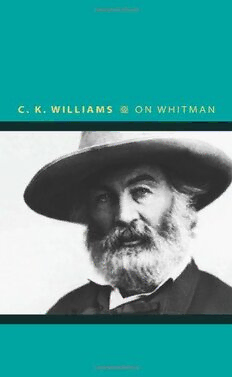Table Of Content• ON WHITMAN
WRITERS ON WRITERS
Philip Lopate | Notes on Sontag
C. K. Williams | On Whitman
C. K. WILLIAMS • ON WHITMAN
PRINCETON UNIVERSITY PRESS
Princeton and Oxford
Copyright © 2010 by Princeton University Press
Published by Princeton University Press, 41 William Street,
Princeton, New Jersey 08540
In the United Kingdom: Princeton University Press, 6 Oxford Street,
Woodstock, Oxfordshire OX20 1TW
press.princeton.edu
All Rights Reserved
Library of Congress Cataloging-in-Publication Data
Williams, C. K. (Charles Kenneth), 1936–
On Whitman / C. K. Williams.
p. cm.—(Writers on writers)
ISBN 978-0-691-14472-6 (cloth : alk. paper)
1. Whitman, Walt, 1819–1892—Criticism and interpretation.
2. Whitman, Walt, 1819–1892—Influence. I. Title.
PS3238.W57 2010
811’.3—dc22 2009040347
British Library Cataloging-in-Publication Data is available
This book has been composed in Minion and Myriad.
Printed on acid-free paper. (cid:39)
Printed in the United States of America
10 9 8 7 6 5 4 3 2 1
• CONTENTS
Preface vii
Note xiii
The Music 1
The Past 5
Beginnings 9
Vision 14
Depths 21
The Man Before the Poems 23
Self-Made 27
The Notebooks 36
Emerson and the Greatest Poet 40
The Greatest Poet Submits a Poem for Publication 47
“I” 48
A Dare 54
“You” 57
America 65
The Modern, One: Baudelaire 74
Hugo and Longfellow 80
The Modern, Two: Eliot and Pound 83
Others 87
The Body 91
Sex 101
Woman 112
Lorca, Ginsberg, and “The Faggots” 119
Nature 129
Prophets 139
Imagination 149
Mortality 153
Mortality Again 163
The Sad Captain 171
Lines 172
The Voice 178
Life After 181
What He Teaches Us 184
vi •
• PREFACE
When I mentioned to a poet-friend that I was
thinking of writing a small book on Whitman,
he answered, “What in heavens name is left to
say?”—a very reasonable question. The mass of
commentary on Whitman, on Whitman’s poems,
Whitman’s America, Whitman’s world, is all but
overwhelming. A bibliography of the germane
commentary on the poetry would make a large
volume in itself; a consideration of the work that
attempts to situate the man in his time and place
would make another. To mention just my two of
my favorite books: Paul Zweig’s Walt Whitman:
The Making of the Poet is a sensitive, erudite po-
et’s probing of the unlikeliness of a phenomenon
like Leaves of Grass being generated by what to
all appearances was a rather mediocre journal-
• vii
ist and sometime lecturer in the disorganized
turbulence of nineteenth-century Brooklyn and
Manhattan. And David S. Reynolds’s Walt Whit-
man’s America is a meticulous, comprehensive,
and illuminating study of the culture and the
civilization from which Whitman and his poems
were brought forth: it’s an inspired consideration
of many too-little-noticed aspects of nineteenth-
century American life and an indispensable
companion to the poet’s work.
Over the course of my writing life and in pre-
paring to write this book, I’ve read—not at all
systematically, to be sure—quite a lot on Whit-
man. But it recently occurred to me that there
was something I was no longer enjoying in read-
ing what has been said about the sources and the
purposes of Whitman’s poetry. Paradoxical as it
might seem, in preparing this book I just didn’t
any longer want to balance against the work the
marvelous insights in the Zweig and Reynolds
books, for instance, about Whitman’s devotion to
opera, or to oration, or to the half-cracked science
of phrenology which nonetheless nourished him
with so many images and terms. As useful as their
research has been in situating Whitman’s work
in its time and place, all of it is finally reabsorbed
viii •
into the sheer, ever-amazing power of the poems
themselves.
Even more oddly perhaps, I didn’t particularly
want to revisit the mass of what Whitman him-
self had to pronounce about his grand intentions
and ambitions for his poetry. I don’t mean to say
that I’m not glad to have been exposed to all of
it, but I felt the need to clear the air —to approach
the poetry as I had when I first came across it, to
try to reestablish and reconfirm the raw power
of the poetry in the context it was making for it-
self on the page, not in the range of all that lay
behind it.
For a young poet, reading Whitman is sheer
revelation, sheer wonder, a delight bordering on,
then plunging into disbelief. How could all this
have come to pass? This stupendous, relentless
surge of poetic music with its intricate and con-
stantly surprising combinations of sound? These
countless images of daily life, of common life
made uncommon, and the most boldly uncom-
mon made jarringly intimate? Whitman’s auda-
cious eschatological and metaphysical specula-
tions were precious to him, yet so precisely and
judiciously are they embodied and embedded in
his poetry that they end up being more feasible
than most or, for some of us, any religious texts.
PREFACE • ix

